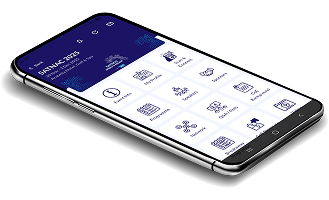SATNAC
SATNAC is an annual conference held in South Africa where important stakeholders in telecommunications and technology — like researchers, students, industry experts, and government — come together to share ideas, present research, and discuss the future of Information and Communication Technology (ICT). It's a space where academic thinking meets industry practice, making it an important event for anyone interested in how technology is shaping the future in Africa and beyond.
SATNAC 2025 will take place at the Arabella Hotel, Golf & Spa, Kleinmond, Hermanus, Western Cape, South Africa, from Sunday, 30 November 2025, to Wednesday, 3 December 2025.
Ready to Take on the Challenge?
SATNAC Industry Solutions Challenge invites postgraduate and undergraduate students based in South Africa who are passionate about innovation to participate in an innovation challenge where they will get the opportunity to tackle industry-inspired challenges and propose innovative solutions. Throughout the competition, participating individuals or teams are given the opportunity to apply research, analytics, and technical skills to develop practical solutions under the mentorship of industry experts from sponsoring partners.
By participating in the challenge, you stand a chance to win an exclusive, fully sponsored opportunity to attend SATNAC, South Africa's premier ICT research & innovation forum, in addition to sponsor prizes. This opportunity will allow the winner to showcase their solution, network with top industry leaders, and gain career-boosting exposure to cutting-edge technology trends.
In the challenge, participants will be guided through the full innovation journey, from generating ideas, shaping them into clear concepts, developing practical prototypes, and finally learning how to pitch their solutions effectively, through a series of dedicated masterclasses and mentorship sessions from industry experts. Participants are expected to participate in challenge activities from Ideation to Pitching, to qualify for the SATNAC Industry Solutions finale event. A YouTube link to last year's finale event can be accessed here.
- Visits to innovation hubs
- Gain visibility with potential employers, opening doors to internships and work opportunities.
- Network with business and technical teams from our sponsoring partners.
- Get exposure to and interact with business executives & captains of industry within the ICT sector
- High-value prizes from leading technology and telecommunications companies.
- Develop essential skills in design thinking, problem-solving, data analytics, and presentation.
- Receive expert guidance from industry and academic leaders.
Don't miss out on this chance to develop & showcase your skills and shape the future of technology.
NB: Only applicants registered with a South African Institution of Higher Learning and/or residing within South Africa are eligible to take part in the challenge.
Important dates:
- Closing deadline for applications: Sunday, 21 September 2025 (23h59)
Prizes & Recognition
Participation Acknowledgement: Every participant who presents a solution will receive a certificate signed by the SATNAC Chairperson.
Customised skills development or packages from topic sponsors
High-value sponsored prizes
Live SABC Broadcast of the Awards Ceremony at SATNAC
The winning group will have to nominate one member to receive the SATNAC 2025 Innovator Award

